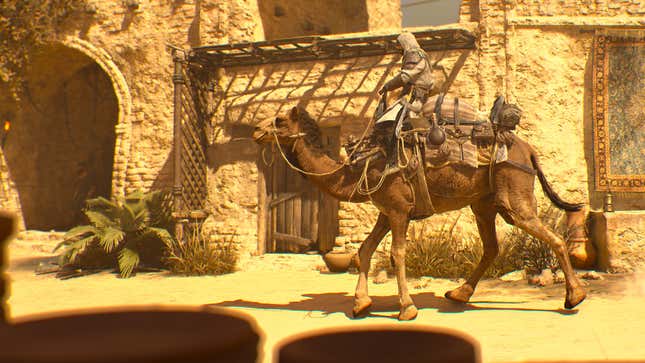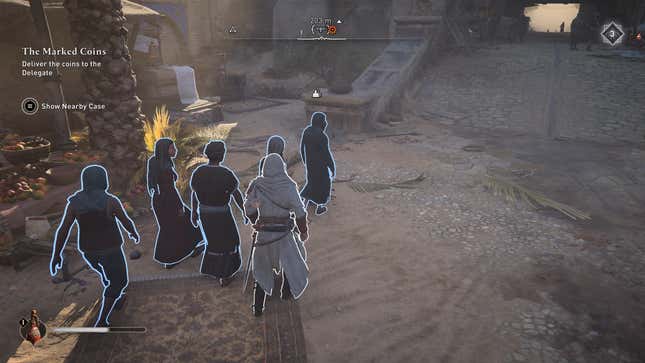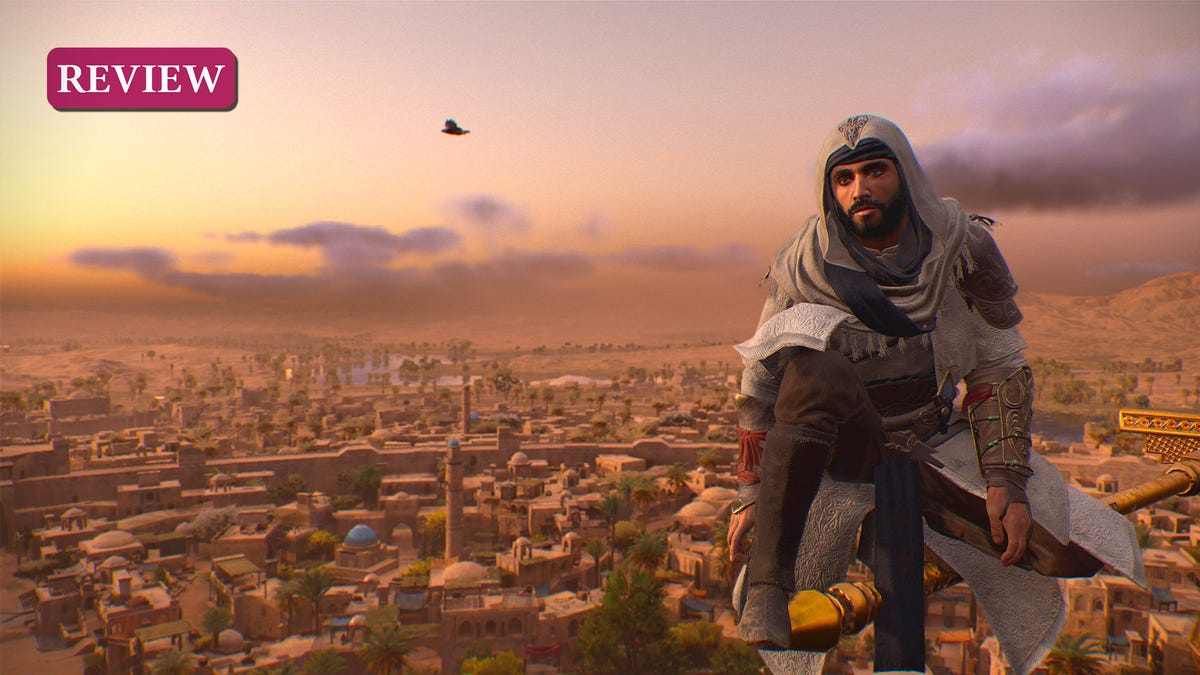Assassin’s Creed Mirage isn’t like the past few games in the series. It’s not like Odyssey, and it’s not like Origins. Those games both evolved the series into something bigger, adding hundreds of side-quests and newfound RPG elements, like loot drops and enemies with levels. Those games were fun. I enjoyed exploring their massive worlds for far too many hours. But over the years, I’ve also longed for a return to the smaller, more stealth-focused adventures that began the series back in 2007.
And as Ubisoft has been promising, Assassin’s Creed Mirage is exactly that. Assassin’s Creed Mirage transports you back to a time when stealth mattered, climbing was a puzzle, enemies could be dispatched with a single sneaky blade, and the titular assassins of the series were actually assassins. Mirage brings back some less-than-great elements from the classics, too, but for the most part, it makes for a welcomed return to what made the Assassin’s Creed games so popular over a decade ago.
Not all stories need be told
Out October 5, 2023, Assassin’s Creed Mirage is a prequel to 2020’s Assassin’s Creed Valhalla. It tells the origin story of the assassin Basim, an important character who appeared in Valhalla and played a major role in that game’s narrative. In Mirage, we meet up with Basim 12 years before his appearance in Valhalla, when he’s just a 20-year-old street thief trying to survive in Baghdad. In a very short amount of time, especially compared to past games’ introductory sequences, Basim is swept up into a set of events that lead to him joining the Assassins (then known as the “Hidden Ones”) and helping them fight against the Templars (aka the “Order of the Ancients”).
Of course, if you played Valhalla—which isn’t necessary to enjoy Mirage, to be clear—you know that Basim isn’t just a lonely street thief. And we learn a bit more about who he really is by the end of Mirage.
However, Mirage’s main story is definitely the weakest part of the game. I like Basim and it is nice to see how he becomes the assassin we meet later, but 99% of what happens in Mirage is so low-stakes and sectioned off from the rest of the franchise that by the time the credits rolled I wasn’t sure if this story needed to be told. I didn’t feel like I learned anything revelatory about Basim, the Assassins, or any other part of the series.
Thankfully, the narrative—which will take most players about 10 to 15 hours to finish—moves forward quickly. Because it never expands to include world-ending machines or other modern-day lore, it feels grounded in a way that most past games haven’t. At its core this is a story about Basim and his struggles with the order of Assassins. Another bonus: What happens in Mirage is easy enough to follow for newcomers and vets alike, so no need to read up on lore before playing. (At the very end it goes off the rails in classic Assassin’s Creed fashion, but by then Basim’s arc has wrapped and you can check out if you don’t care about the series’ weirder lore.)
Plot weaknesses aside, I found myself happy to have experienced this chapter of Basim’s life, not just because I liked the characters I met, but because it provided the foundation for the small-scaled, stealth-focused Assassin’s Creed I’ve craved for years.
Creepin’ and stabbin’ guards like it’s 2007
The first time I ran down an alley, cut across a market, and then hid on a bench to “blend in” with the crowd, I felt something inside me awaken. A part of my gaming past—old Assassin’s Creed skills and muscle memories long buried—returned. I’ve done this song and dance before, creeping around lavish Middle Eastern palaces, hiding guards’ bodies in hay-filled carts after stabbing them quietly, and using blow darts to pick off baddies from the shadows. I’ve done this all before, and I’m happy to be doing it again.
Sure, even the big “RPG”-style Assassin’s Creed games, like Valhalla, retained a few stealth elements. But the cities and missions of those games never seemed designed around rewarding players for creative uses of social stealth or ninja tactics. That’s not the case in Mirage. Fighting guards here isn’t easy. They will quickly kick your ass, especially if you get surrounded. And this time around, you don’t have powerful magic attacks that can wipe out entire crowds of foes. You also aren’t equipping shields and multiple weapons before large-scale battles.
Instead, most of Mirage’s missions let you straight-up avoid combat and even killing people if you’re patient, stick to the shadows, and use your tools to put guards to sleep or distract them from where you want to go.
This makes Mirage a slower and quieter Assassin’s Creed game than recent entries. I found myself using my trusty eagle to spot guards and waiting until just the right time to make my move, which reminded me a lot of how the older games—think Assassin’s Creed 2 and 3—played and felt. This is a good thing.
Even better, though, Ubisoft wisely doesn’t completely rewind the clock to 2007, so Mirage’s controls feel more responsive than those of clunkier, older entries, you can still crouch like you could in Valhalla, and its visuals are just as gorgeous as the Egyptian deserts of Origins or the islands of Odyssey. At times, playing Mirage, it almost felt like I was playing a modern remake of the original Assassin’s Creed.
At least, until I hit a button to activate the one otherworldly power Basim has in Mirage, which lets him instantly take out up to five guards by teleporting around the area in seconds. It’s a bit odd, but because you have to earn this ability by being stealthy, it feels like a nice reward for being a good assassin. And if you really dislike it, you can complete all missions and side-quests without ever using it.
If you screw up—like accidentally gutting a guard in front of his five friends you didn’t spot beforehand—the game tracks that via the return of the notoriety meter. The more mayhem you commit in front of people, the harder guards look for you and the faster citizens will spot you while you explore. Tearing down wanted posters or bribing a town crier can quickly solve this issue, but it’s nice that your mistakes have consequences and it adds a level of tension to every stealth encounter that I appreciated.
That’s life in the (not so) big city
Assassin’s Creed Mirage isn’t massive, featuring only one large city—Baghdad—with a chunk of wilderness and a few villages outside it. People who judge games based on hour counts and map sizes might find Mirage to come up short. But for players who prefer games that don’t feel overstuffed with padding and side missions, Mirage will be a wonderful gift.
Ubisoft has seemingly, for the first time in a while, resisted the siren’s call that leads to its open-world action games being completely papered over in map markers, locations, and quests. In fact, Mirage is a great example of how shrinking down the scope of an open-world adventure can help it feel bigger in a weird way. That’s because the one large city in Mirage is filled with nooks and crannies not found in the cities from more recent AC games. There are just so many locations to explore and areas to poke at in Baghdad; all of it impressively detailed, too. It’s a dense place, and I often spent time just running around its rooftops and admiring the view.

That’s also a big part of why parkouring around feels so good. Again, as with stealth, the ability to climb around buildings and towers has always been a part of the series, even in the newer RPG installments. But the cities in more recent games never felt like parkour playgrounds. In Mirage, they do. Exploring Baghdad on foot is thrilling. Every few moments I felt like I was doing something very cool, like swinging around a corner of a building or sliding over boxes before hopping across an alley gap.
Climbing and parkouring around Baghdad is a treat even though Mirage limits what you can climb, more so than the most recent AC games. As with the smaller map making the world feel bigger and more dense, this shrinking of options makes climbing and exploration much more satisfying and fun. That might seem counterintuitive, but by making you look for handholds or places to climb, the game makes puzzles out of parkouring up the franchise’s iconic towers or getting into enemy bases. Solving these climbing puzzles feels great, and learning what to look for helps it feel like you’re genuinely becoming a master assassin like Basim.
This is still Assassin’s Creed, though, which means you’ll still occasionally climb up a wall you didn’t want to climb or jump off a tower when you meant to go up. That parkour jank is still present in Mirage, even if it’s not as bad as in the past. At this point, like the Animus and Templars, it feels like a part of the franchise’s DNA.
A successful return to a different era
I know some players, especially fans of Assassin’s Creed more RPG-like entries, will likely read Mirage reviews and feel disappointed. It’s a smaller game. There’s less to do. Its narrative isn’t epic. There are no giant battles to fight. Its world isn’t so massive that you’ll spend 200 hours exploring. And no, there’s no loot to be had or powers to unlock.
Instead, Mirage offers a return to a kind of open-world game we don’t see as often, a smaller adventure unlike anything Ubisoft has released in years. An open-world action game that most players will finish in a weekend or two.

For some, that sucks. For others, Assassin’s Creed Mirage will be a wonderful gift. A treat. Something that doesn’t overstay its welcome or feel like it’s going to suck away your life for months and months. And for fans who long for the classic Assassin’s Creed stealth gameplay, Mirage will be exactly what the doctor ordered: a manageable adventure that features a lot of assassinations, sneaking around, and climbing stuff.
I’m not foolish enough to assume Ubisoft is going to change the direction of the series and make all future AC games like Mirage. Of course not. The big games sell incredibly well and can be supported for months and years with DLC.
But it’s nice, in 2023, to play a modern AAA open-world video game that doesn’t feel like a slog to work through. One which rewards stealth and non-lethal tactics, too. When I was finished with almost everything Mirage had to offer—after about 25 hours—I found myself hopeful that Ubisoft will continue making not just big “RPG” Assassin’s Creed games, but also smaller, stealthier entries, too.
In a perfect world, we’d get one of these every few years, between bigger installments like Valhalla. After playing Mirage, I’d really, really love to live in that perfect world.
.

